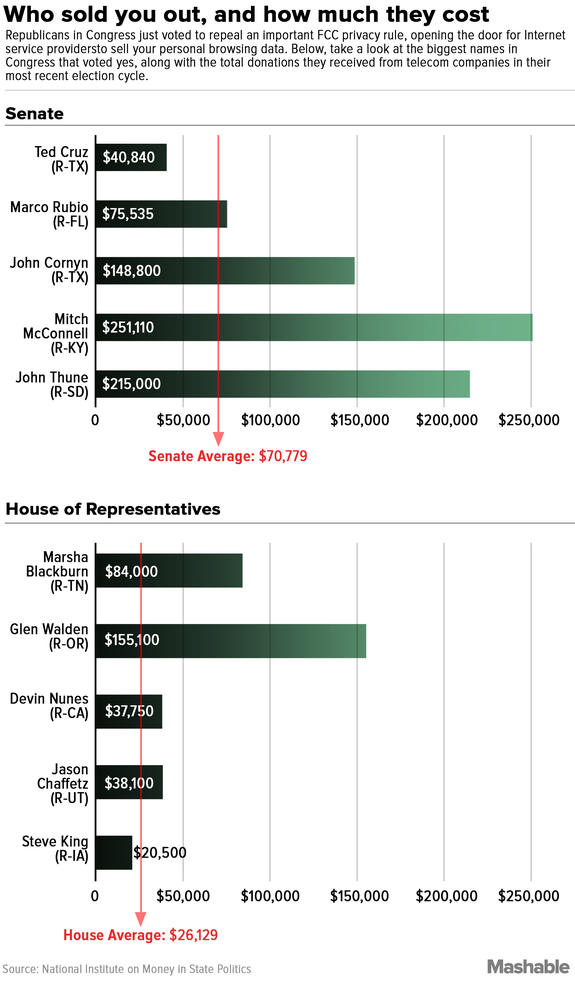Republicans who voted against internet privacy got paid out

Cash rules everything around D.C.
That's hardly a new revelation, but it's worth revisiting after Congress recently voted (twice) to gut important data privacy regulations that would have forced your internet provider to at least ask your permission before tracking you across the internet and selling that information to the highest bidder.
SEE ALSO: The FCC is already declining to enforce net neutrality
Trump is expected to sign the bill into law soon, ensuring your data will no longer be yours and that internet service providers will be able to make a ton of money off it. Great news.
But how the hell did we get here? The easy answer: Money. Bags of it. The telecom industry has given huge amounts of cash to the politicians who voted to give them basically unlimited powers to track your internet usage and then sell that data to the highest bidders.
What the hell happened?
Well, the Trump administration hired an unabashedly pro-industry head of the government's primary regulator of internet providers. That person, Ajit Pai, put the rule protecting you against it in the guillotine right away. And the Republican congress was happy to fall in line.
The U.S. Senate vote that approved the repeal a week ago was strictly along party lines: 50 Republicans for (and 2 voting absent) with 48 Democrats against.
Tuesday's U.S. House vote was similarly party-oriented. The main difference was the defection of 15 Republicans who joined Democrats in voting "no" but that didn't matter as the bill still passed by a tally of 215 to 205 with 9 no votes (6 GOP, 3 Dems).
But, also: money. Lots of it. Given to congressmen.
It pays to play
Those 265 congressmen who voted to repeal have more cash in their pockets thanks to the telecom industry, as flagged by The Verge. Data collected by the National Institute on Money in State Politics showed how much each of those 265 legislators collected from telecom corporations or employees of those corporations in the recent election cycle.
And, unsurprisingly, those with connections to important committees for the telecom industry tended to be among the biggest takers.

Image: bob al-greene/mashable
The biggest benefactor? Why, Senate Majority Leader Mitch McConnell, of course, who bagged over $250,000 for his most recent election from these donors. Eleven other senators hit six digits in donations, too, including John Thune of South Dakota, chairman of the Senate Committee on Commerce, Science, and Transportation, who came away with $215,000.
The donations for House members were considerably smaller but there were some who still raked in some healthy dough. Greg Walden (OR), who just so happens to be the chairman of the House Energy and Commerce committee, pulled in the most of any House member at $155,100.
It's all about that cold, hard cash
The Intercept's Glenn Greenwald, who knows a thing or two about online privacy, went in hard on what he calls "corporate-donor servitude" in a column following the vote, noting that the forces involved here didn't even try to dress the vote up as necessary for national security.
Damn straight.
Greenwald used quotes from Congresswoman Marsha Blackburn (TN) and Senator John Cornyn (TX) throwing out more random reasons for the repeal to prove his point. Blackburn said the original regulation was "big government overreach" and Cornyn said it would "stifle economic growth."
So let's bring it full circle: Blackburn, who followed Walden's footsteps as chairman of the House subcommittee on communications and technology, received $84,000, according to the data The Verge shared.
And Coryn, who chairs the Senate's Subcommittee on International Trade, Customs, and Global Competitiveness, received $148,000, which is certainly positive economic growth for Coryn.
Data & consequences
So, here we are. None of this is necessarily shocking but, as Greenwald notes. What is surprising is just how little effort was put in to making this seem like anything other than what it is: the opportunity for those telecom companies — who are stoked to offer you unlimited data! — to sell off your data to the highest bidder.What are the downsides? If you can think of it, it's probably there. The Electronic Frontier Foundation (EFF) recently highlighted five really creepy things this could lead to, like injecting ads and tracking cookies or hijacking searches.But there are plenty of other risks your vulnerable to now.
Hackers stealing your data via a breach of a company that's already bought your data (because these breaches never happen, right?).
Sensitive data falling in to the wrong hands leading to blackmail or extortion, an extreme example but not outlandish. If you have Pornhub in your cache — which is completely fine and legal — but you wouldn't want your employer knowing, it's easy to see how a hacker could get that data and threaten you with it.
Insurance companies buying your data to see if you're lying about your health. Example: you told them you don't smoke or drink to lower your costs but you spend all your time searching for vape pens and craft beer.
Less important, though no less weird, it allows entities like Facebook to purchase your data and target you with really specific ads. I'm a fan of both the Chicago Cubs and jam band Phish, two seemingly disparate entities. But because Facebook has data showing them I'm a fan of both, they were able to target me with this incredibly specific ad.
Facebook's algorithm for ad targeting is frighteningly specific sometimes pic.twitter.com/2sCIjWNr3J
— Marcus Gilmer (@marcusgilmer) March 5, 2017
So get ready for more of this. And for those companies to access all of your data whether you want them to or not. And the money those companies paid out to your elected representatives will, in the long run, likely pale in comparison they'll reap when they make money off your private data.
Something to keep in mind next time you enter the voting booth.
